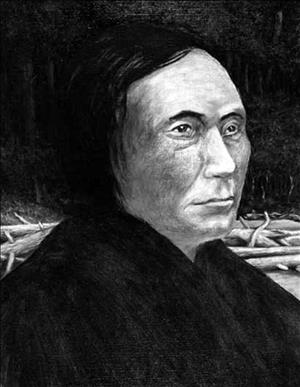On December 10, 2004, a special state historical court clears Nisqually Chief Leschi (1808-1858) of murder charges. Chief Leschi was hanged in 1858 for allegedly murdering Col. A. Benton Moses. At the time of his two trials, Leschi and his lawyers argued that he and Moses were legal combatants in a war (the Indian War of 1855-1856), and that whoever killed Moses could not be legally charged with murder. This is the exact opinion of the special historical court that exonerates the Nisqually chief's name in 2004.
Correcting the Historical Record
The unanimous ruling was made by a seven-member panel of present and former Washington State Supreme Court justices. In announcing the decision, State Supreme Court Justice Gerry Alexander stated, "Chief Leschi should not, as a matter of law, have been tried for the crime of murder" (Roberts).
After two trials, Leschi was hanged on February 19, 1858, outside the boundary of Fort Steilacoom. Army officials, asserting that Leschi was a legal combatant, refused to permit the execution to occur on military land. Many settlers at the time believed in his innocence.
The historical court did not rule on whether or not Leschi had killed Moses, who died on October 31, 1855, in a skirmish just east of present-day Tacoma. Leschi stated: "I deny that I had any part in the killing ... As God sees me, this is the truth" (Wilkinson).
The ruling has no legal significance, but represents a victory for the Nisqually tribe's years-long effort to exonerate the name of their legendary chief.

